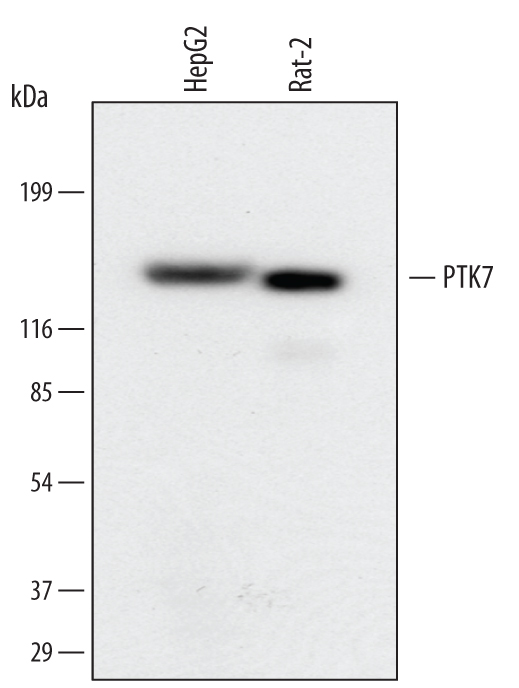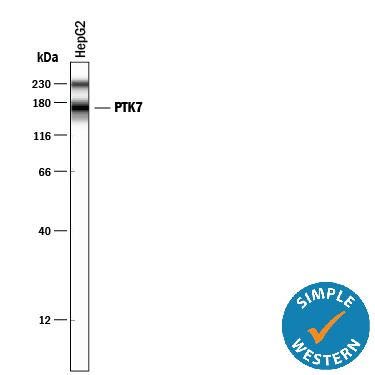Human/Rat PTK7/CCK4 Antibody Summary
Ala31-Ser199
Accession # Q13308
Applications
Please Note: Optimal dilutions should be determined by each laboratory for each application. General Protocols are available in the Technical Information section on our website.
Scientific Data
 View Larger
View Larger
Detection of Human and Rat PTK7/CCK4 by Western Blot. Western blot shows lysates of HepG2 human hepatocellular carcinoma cell line and Rat-2 rat embryonic fibroblast cell line. PVDF membrane was probed with 1 µg/mL of Mouse Anti-Human/Rat PTK7/CCK4 Monoclonal Antibody (Catalog # MAB4499) followed by HRP-conjugated Anti-Mouse IgG Secondary Antibody (Catalog # HAF007). A specific band was detected for PTK7/CCK4 at approximately 160 kDa (as indicated). This experiment was conducted under reducing conditions and using Immunoblot Buffer Group 1.
 View Larger
View Larger
PTK7/CCK4 in Human Colon Cancer Tissue. PTK7/CCK4 was detected in immersion fixed paraffin-embedded sections of human colon cancer tissue using Mouse Anti-Human/Rat PTK7/CCK4 Monoclonal Antibody (Catalog # MAB4499) at 25 µg/mL overnight at 4 °C. Tissue was stained using the Anti-Mouse HRP-DAB Cell & Tissue Staining Kit (brown; Catalog # CTS002) and counterstained with hematoxylin (blue). Specific labeling was localized to the cytoplasm of epithelial cells. View our protocol for Chromogenic IHC Staining of Paraffin-embedded Tissue Sections.
 View Larger
View Larger
Detection of Human PTK7/CCK4 by Simple WesternTM. Simple Western lane view shows lysates of HepG2 human hepatocellular carcinoma cell line, loaded at 0.2 mg/mL. A specific band was detected for PTK7/CCK4 at approximately 168 kDa (as indicated) using 20 µg/mL of Mouse Anti-Human/Rat PTK7/CCK4 Monoclonal Antibody (Catalog # MAB4499). This experiment was conducted under reducing conditions and using the 12-230 kDa separation system.
Non-specific interaction with the 230 kDa Simple Western standard may be seen with this antibody.
Reconstitution Calculator
Preparation and Storage
- 12 months from date of receipt, -20 to -70 °C as supplied.
- 1 month, 2 to 8 °C under sterile conditions after reconstitution.
- 6 months, -20 to -70 °C under sterile conditions after reconstitution.
Background: PTK7/CCK4
Protein tyrosine kinase 7 (PTK7), also known as colon carcinoma kinase 4 (CCK4), is a receptor tyrosine kinase (RTK) involved in colon carcinoma development and/or proliferation. Similar to the RTK HER3, PTK7 contains a catalytically inactive tyrosine kinase domain, suggesting a potential tumor-characteristic role as a signal amplifier or modulator for an as yet unidentified kinase-competent partner. PTK7 may also play a role during gastrulation in the rodent embryo.
Product Datasheets
Citation for Human/Rat PTK7/CCK4 Antibody
R&D Systems personnel manually curate a database that contains references using R&D Systems products. The data collected includes not only links to publications in PubMed, but also provides information about sample types, species, and experimental conditions.
1 Citation: Showing 1 - 1
-
The Increased PTK7 Expression Is a Malignant Factor in Cervical Cancer
Authors: JJ Sun, HL Li, SJ Guo, H Ma, SJ Liu, D Liu, FX Xue
Dis. Markers, 2019-03-03;2019(0):5380197.
Species: Human
Sample Types: Cell Lysates, Whole Tissue
Applications: IHC-P, Western Blot
FAQs
No product specific FAQs exist for this product, however you may
View all Antibody FAQsReviews for Human/Rat PTK7/CCK4 Antibody
There are currently no reviews for this product. Be the first to review Human/Rat PTK7/CCK4 Antibody and earn rewards!
Have you used Human/Rat PTK7/CCK4 Antibody?
Submit a review and receive an Amazon gift card.
$25/€18/£15/$25CAN/¥75 Yuan/¥2500 Yen for a review with an image
$10/€7/£6/$10 CAD/¥70 Yuan/¥1110 Yen for a review without an image

